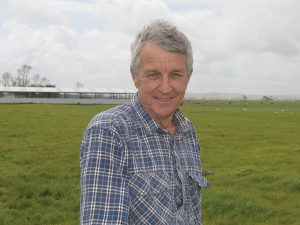Fonterra, Sharesies join to make share trading easier
Fonterra is teaming up with wealth app provider Sharesies to make it easier for its farmer shareholders to trade co-op shares among themselves.
 Greg Gent says Fonterra is a great example of how an agriculture sector co-operative model helps farmers survive.
Greg Gent says Fonterra is a great example of how an agriculture sector co-operative model helps farmers survive.
A strong Fonterra co-operative is crucial for New Zealand dairy farmers, says Ruawai farmer Greg Gent.
He says a lot of farmers can easily miss this point. Fonterra is a great example of how an agriculture sector co-operative model helps farmers survive.
"If it wasn't for Fonterra, we would get paid for our milk a little bit above cost of production, no more - just enough to keep us in business," he told Dairy News.
"So that's the most fundamental reason that Fonterra's got to exist and be strong.
"What farmers can forget is that when you look at Fonterra, it sets the milk price in NZ, and every competitor benchmarks off that price of Fonterra.
"When Fonterra drops its price, they do, when Fonterra lifts its price, they follow."
Gent served on the Fonterra board for 10 years and says during those years he saw the situation in reverse.
"We often competed against co-ops in South America, or wherever it was, for milk: if the co-op was poor performing, we made good money; the co-op doing well, we didn't because we had to pay that milk price.
"So, a strong co-op for dairy is absolutely crucial."
Gent became involved with co-operative governance in 1993 when he joined the Northland Dairy Company board. Over the years he has served on Fonterra's board and chaired insurance mutuals FMG and Southern Cross Healthcare.
He says co-operative is a great model, but needs to be run efficiently like any other business.
Farmer ownership and control are crucial, particularly in a small market like NZ, where you can get price gouging due to lack of scale and lack of good competition. Gent says supermarkets would be a good example of that.
"We are only 5 million people spread a very long way geographically; competition isn't easy as what it would be in any market because of that.
"Co-operatives should always be acting in the best interests of their members but provide services efficiently and be well governed and managed."
Gent points out that in the co-operative model, profits remain in the country. He says, in New Zealand, virtually everything we do, we sell when it's starting to get a bit of scale.
A case in point is a South Island distillery set up in 2015 and regarded as one of the country's foremost spirits producers. Recently a portion was sold to an international liquor chain.
Gent understands the "why" but the reality is, that's profits heading offshore in time.
Gent says the good thing about co-ops is that every bit of profit stays in the country.
But sadly, government doesn't get this, and subsequent governments have failed to throw their support behind co-operatives, he says.
"If you are supplying Yili, or whoever it may be, the profits from those businesses leave NZ."
Gent says NZ is still a primary industry-based economy.
"If primary industry doesn't perform well, New Zealand doesn't.
"It goes back to, where is our competitive advantage in the world, and it's in our primary industries."
NZ has about 330 co-operatives generating nearly 18% of the country's GDP by revenue: about 75% of these businesses are directly involved in the primary sector.
Alongside Fonterra, dairy co-ops include Tatua and the Dairy Goat Co-op. Other primary industry-related co-ops include MG Marketing, Alliance, Silver Fern Farms, Zespri, Marlborough Grapes Co-op, NZ Blackcurrants, Boysenberries NZ, Primary Wool Growers Co-op and NZ Hops.
Co-ops providing the wrap-around support to the ag sector include LIC, Farmlands, RuralCo, Ballance, FMG, Eastpack, Ravensdown and Rabobank.
"When you compare them to other business structures, they are highly resilient, especially during times of adversity such as Covid and our recent weather events," Gent says.
"Due to the shareholders having skin in the game, they tend to hunker down and support each other to ride out the tough times. This is because their fundamental values ensure thinking longer term horizons - that is, maximising profits is secondary to prioritising their members' needs."
Fundamentals Remain The Same
Greg Gent, who has been dairy farming for 40 years, believes the fundamentals of dairying haven't changed.
"Certainly, the scale has. Technology has been great: herringbone, rotary shed, electric fences have all given us a huge competitive advantage so that we could get scale," he says.
Gent believes the dairy sector is looking for its next major technological breakthrough now. He hopes it comes in the environmental space.
"I hope some good science will come and resolve some of environmental issues, even though we have a very low carbon footprint by international standards.
"But on the other hand, the world must be fed. There's no use in being green and starving."
Southland farmers are welcoming moves by the Government to repeal intensive winter grazing rules.
Third-year student Cady Burns has won the Waikato Regional Council Prize in Water Science for 2024.
Sam McIvor has been appointed OSPRI’s next chief executive.
The Rural Change programme, providing free private mental health professional sessions to the rural industry, is set to continue its next chapter within Rural Support Trust from 1 July 2024.
Beef + Lamb New Zealand chief executive Sam McIvor will step down in July.
A new report shows farm employers across the dairy, sheep and beef, and arable sectors have continued to invest strongly in one of their greatest assets – their staff.
OPINION: Talking about plant-based food: “Chicken-free chicken” start-up Sunfed has had its valuation slashed to zero by major investor Blackbird…
OPINION: Synlait's financial woes won’t be going away anytime soon.